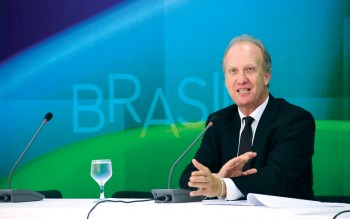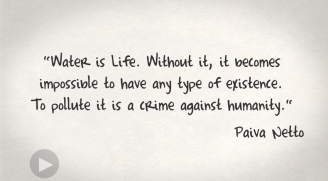
Brazil’s assessment within the context of the MDGs
Minister Marcelo Neri takes stock of the MDGs and talks about the gains in development for the post-2015 agenda in Brazil
By the Editorial Staff
Thursday | August 14, 2014 | 5:59 PM | Last update: September 22, 2016, 4:07 PM (Brasilia time)

The Minister of the Secretariat of Strategic Affairs of the Presidency of the Republic of Brazil (SAE/PR), Marcelo Cortês Neri, received the team of the Super Good Will Communications Network (radio, TV, web portal, and publications) for an interview in Rio de Janeiro, Brazil. Neri holds a Ph.D. in Economics from Princeton University and a Master’s and Bachelor’s degrees also in Economics from the Pontifical Catholic University of Rio de Janeiro (PUC-Rio). He distinguished himself in his study of the changes which the Brazilian economy has undergone over the last twenty years, with the reduction of poverty and the rise of a new middle class, which was created as a result of economic stability, social programs, and adjustments in the minimum wage. He was the founder of the Center for Social Policies (CPS/FGV) and president of the Institute for Applied Economic Research (IPEA), a body linked to the SAE. His main areas of research are social policies, education, and microeconometrics.
In the following conversation with GOOD WILL magazine, the minister talks about the results of the 5th National Monitoring Report on the Millennium Development Goals, which was published on May 23 of this year, with updated information regarding the situation of the MDGs in various Brazilian regions. He also comments on some of the most representative indices in the report, showing that over the last few years the country’s social indicators have continued to improve.
GOOD WILL — How have the MDGs helped with government and civil society planning?
Marcelo Neri — The Millennium Development Goals were established by the United Nations in 2000. Brazil is one of the 190 signatory countries. Here in our country, whether from the point of view of society, the population, or governments, these goals had a major effect and were responsible for improvements in social indicators. If we compare the period since the launch of the targets, in the UN Millennium Summit of 2000, in fact it has been a time of accelerated improvement in Brazilian social indicators.
GW — Has civil society become involved in complying with these targets?
Marcelo Neri — I believe so. I think Brazil is a special case because of the path it has assumed, which is both to grow and reduce inequality at the same time. It is one of the few countries doing this. Normally, the choices are for one or the other, but Brazil is doing a little of both. For example, the first millennium goal is to reduce extreme poverty by half, and in ten years Brazil has reduced it by 69 percent. We did more in 10 years than what was supposed to be done in 25. This is explained by our growth and reduction in inequality. More than that, when Brazil assumed the goal to reduce by half it said: “Let’s reduce it by 100 percent.” This Brazilian movement is being followed by other countries, by the United Nations. . . So, the population and the government really got involved.
GW — Brazil has also reached the goal of reducing the mortality indicators of children under 5 by twothirds. In 1990, the rate was 53.7 deaths per 1000 live births, and went down to 17.7 in 2011. What are the new steps?
Marcelo Neri — This used to be a nation known as “the country of the future”, but in which a large proportion of the children died before reaching the age of five. In fact, you had no future. Not dying in the first five years is obviously very little. You have to think of another agenda that not only favors rights—thinking about avoiding negative situations—but that also promotes positive rights, which means the child has the right to play, to develop, to be stimulated, etc. Brazil is on the way to achieving this.
GW — The same occurs with MDG 7: to ensure environmental sustainability, which includes the target of reducing by half the proportion of the population without access to safe drinking water and basic sanitation, which was completely achieved in 2012. What did that mean?
Marcelo Neri — There is a certain relationship between child mortality and sanitation, in particular. I confess that even regarding this goal I was surprised, because Brazil went faster than we were expecting it to. With regard to access to water, we already had good coverage. . . . I see that the Brazilian society is now waking up to the lack of sanitation. I mean, the lack of water and electricity are things that each individual perceives in their own home. What is new is the lack of sewage mains; people do not know correctly if their home is connected or not, or if the sewage is treated or not. This change in mentality is a victory, the result of a new milestone. The Getulio Vargas Foundation has carried out research on the lack of sanitation. It is just the beginning. Brazil has a long way to go, because sewage has to be treated. But it is natural for you to have some goals and then move on to more ambitious ones.

GW — With regard to the environment, what has the country done to reduce the emissions of greenhouse gases?
Marcelo Neri — Brazil began embracing this cause in a more institutional way after the 1992 Rio Earth Summit. We are precisely between the conclusion of the Millennium Development Goals, the MDGs, and the preparation of the Sustainable Development Goals, the SDGs, which were discussed at Rio+20 and that are a combination of inclusive and sustainable development. So we are on a path that seeks to go beyond the economic and social issues, and considers also the environmental aspect. This is a cause that mobilizes the Brazilian society. Between 2004 and 2010, there was a 75 percent reduction in deforestation. It has to be said that, like the subject of inequality, the environmental aspect is still very bad. The picture today is much better than it was twenty years ago, but we cannot become complacent. New targets will come that are being discussed now and in these new goals Brazil will have an important role to play.
GW — What is the role of income transfer programs in carrying out public policies?
Marcelo Neri — The Bolsa Família has an important role to play, but the protagonist in all of this is the labor market, which explains 55 percent of the reduction in inequality and three-quarters of the increase in people’s income. Bolsa Família explains more or less 12 percent of the drop in inequality. It costs very little, only half percent of the GDP (Gross Domestic Product), and benefits almost a quarter of the population. In fact, Brazil has not only grown and reduced inequality, but carried this out based on an increase in income from work, which is important because it is sustainable. It has inherited the educational policy that has been put into practice in the last couple of years with improvements in the quality of teaching. At the same time it counts on programs such as the Bolsa Família and the Previdência Rural. . . . So Brazil has also diversified and not put all its eggs in the same policy basket.
GW — Offering quality primary education for everyone is one of the most relevant MDGs. The country still has great challenges in this area. . .
Marcelo Neri — In relation to primary education, Brazil has a challenge in terms of quality. As the report shows, 98 percent of the children aged 7 to 14 are already in school. What needs to be done is to improve student learning and [create more] full-time schools, but there are already policies in this direction. We have a great challenge in early childhood education—day care centers and actions alike—and also in secondary education. The good news is that Brazil is making progress. We have increased, for example, direct public investment in education, which went from 3.9 percent of the GDP to 5.5 percent between 2000 and 2012. Congress has just approved the Plano Nacional de Educação [National Education Plan]. We already have quality goals, such as Prova Brasil, of IDEB, which is the Basic Education Development Index.


